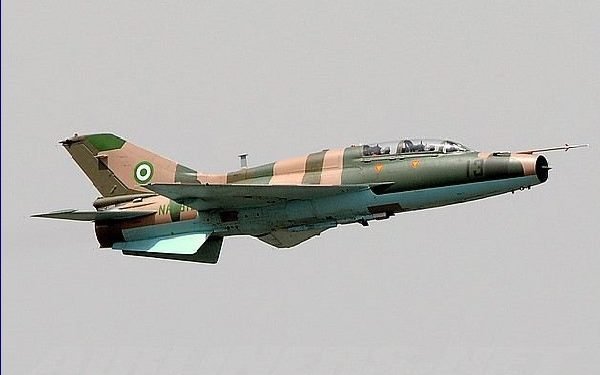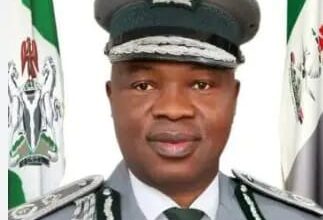Controversy over Air Force jet in Kaduna

There was controversy on Sunday over the reported crash of another Nigerian Air Force Alpha Jet in Kaduna State.
The Nation reported that it gathered from a source close to the Airforce that there was no casualty in the accident as the lone pilot of the fighter plane parachuted to safety.
But NAF NAF’s Director of Public Relations and Information (DOPRI), Air Commodore Edward Gabkwet, said the headquarters had not received any operational report of a crash of its aircraft.
He added that no alpha jet left Yola, Adamawa State, where the jet was said to have taken off to Kaduna for an operation against bandits in Birnin-Gwari Local Government Area.
A NAF source, who spoke with The Nation said: ”I can tell you there was a crash. It involved an Alpha Jet. I can also tell you that there was no casualty. The pilot was able to eject before the crash.
“The jet which departed Adamawa State, was on a mission to fight against bandits in Kaduna State.”
He added that rescue parties had been despatched to search for the fighter jet.
The latest incident is the fourth involving the NAF fleet this year. One led to the death of was a serving Chief of Army Staff (COAS) Lt.-Gen. Ibrahim Attahiru and 10 other officers in Kaduna two months ago.
On April 2, another Alpha jet crashed in Borno during an operation. There was also the Minna-bound Beechcraft King Air350i crash of March 21, that killed all seven people on board.
According to reports, there have been 11 military plane crashes in Nigerian since 2015 that killed no fewer than 33 officers.
The Nation Newspaper in an article entitled “X-raying Nigerian military aeroplanes’ constant crashes,” stated that the rate at which Nigerian military air planes are falling off the sky is becoming worrisome. Early May this year, the Nigerian Air Force marked 57 years anniversary with pride that it has evolved into a formidable Air Force with massive airpower.
Available statistics show that the Nigerian Air Force is one of the best in Africa. It is reputed as the third best Air Force in the continent after the South African Air Force with aircraft strength of about three hundred.
But despite these impressive figures, the Nigerian Air Force planes have had three crashes in less than four months with a casualty of 20 officers, including the immediate past Chief of Army Staff, Lieutenant General Ibrahim Attahiru.
On February 21, a Beechcraft KingAir BB350i crashed due to engine failure, killing the seven personnel on board. On March 31, a NAF Alpha jet with two crew members was declared missing after it disappeared from radar and has not been found. While still awaiting the outcome of the investigations on the two ill-fated aircrafts, another Beechcraft 305 conveying the Chief of Army Staff and ten other officers to Kaduna State for the Passing Out Parade of soldiers on May 21 crashed at the Kaduna International Airport, killing everybody on board.
Though these are not the only crashes recorded by the Nigerian military in recent times but the frequency with which the three incidents occurred, has flagged the red light, suggesting that something may be wrong with the serviceability of the aircraft or the competence of the aircrew.
Between 2015 and 2021, eight plane crashes have been recorded. On November 14, 2019, a trainer helicopter crashed in the NAF Base in Enugu after a routine training exercise. Similarly, on August 17, 2019, a NAF aircraft RV-6A Air Beetle crashed near Kaduna, killing the instructor pilot. On June 12, 2019, a NAF helicopter also crashed while trying to land at the Katsina airport and on January 2, 2019, a Nigerian Air Force Mi-35 helicopter gunship crashed near Damasak, Borno State, killing the five crewmembers.
On September 28, 2018, two F-7Ni aircraft crashed around Katampe Hills in Abuja, the airplanes collided with each other during a rehearsal for Nigeria’s 58th independence anniversary celebration. On July 6, 2017, a NAF Agusta 109 Light Utility Helicopter crashed in Borno River.
Also on August 29, 2015, a Nigerian Air Force plane crashed into a house inside a barracks in Kaduna, killing all seven people on board. On October 10, 2015, a F-7Nl jet crashed and claimed one life, while on November 15, 2016 an Augusta Westland 101 helicopter crashed in Makurdi, Benue State.
There have also been cases of Blue on Blue incidents, military parlance for firing own troops. Pilots in military operations in the frontlines, especially in the Northeast, have shot at military convoys and Internally Displaced Persons camps, killing dozens of civilians.
Expectedly, these air mishaps have opened a floodgate of conspiracy theories by Nigerians and stakeholders in the aviation industry and the security circle. While some are calling for thorough investigations, other are demanding an outright grounding of military aircrafts to pave way for expert assessment.
With aircraft serviceability rate of 78 per cent, it will be near out of place to conclude or assume that the NAF plane crashes is as a result of the state of the aircraft. More so the Nigerian Air Force in the last six years has placed priority on training and retraining of pilots both within and outside of the country. Consequently, over 115 pilots have been winged within the time under review, while about 117 others are still undergoing training.
The Nation’s findings showed that majority of the aircraft in the NAF fleet have undergone Life Extension Programmes (LEF), a maintenance packet for ageing airplanes.
Also twenty previously grounded aircraft such as Falcon 900, ATR-42 Beechcraft, Super Puma, F-7Ni, EC-135 Do-228, Mi-24V, Mi-35P, C-130H and L-39ZA were reactivated and injected into the fleet in the last six years, raising concern about their air worthiness.
Could it mean that some of the aircraft in the fleet have outlived their lifespan? Or could it be that while they were grounded, the critical components have been weakened as a result of exposure to weather conditions as advised against by the manufacturers?
Better still, are the engineers carrying out the in-country reactivation and maintenance, as well as the Periodic Depot Maintenance (PDM) are they armed with the requisite knowledge about the respective aircraft? Do they possess equal competence with the manufacturers to fix the planes?
Perhaps these are the questions that the recent Committee set up by the Chief of Air Staff, Air Marshal Oladayo Amao, to audit the Operation and the Engineering Units of the Nigerian Air Force will answer.
A retired Presidential fleet pilot and aircraft accident investigator with the North Atlantic Treaty Organisation Certificate for Aircraft Accident Investigation and Flight Safety, Air Commodore Peter Gbujie (rtd), said it is impossible to determine the cause of an aircraft accident until it is investigated.
According to him, there are a number of factors that could cause an aircraft accident, which he said are captured in the ‘six M-Factor’, which include Man, Machine, Maintenance, Mission, Management and Money.
He said: “When investigating an accident, you discover that there are root causes of an accident, these are what are regarded as immediate causes, then there are contributory factors, that is the remote causes that you cannot see until you investigate. Even during investigation, you may not see all the causes, some of them may not be related to a particular accident but may have led to it.
“So when an accident occurs, the best thing is for people to hold their opinion and then investigate. The cause of accident A might be different from the cause of accident B, it could also be the same but what is important is that for an accident to occur, there are chains of events.
“This chain could have started long ago, even from the recruitment of pilots, even from the selection and purchase of machines, then up to the point of the occurrence of the accident, so for a particular accident to be prevented, somebody has to break the chain along the line with one intervention or the other, particularly if it has been observed.”
On whether the brand of aircraft could be responsible for the air crashes, Gbujie said: “Not necessarily so, you cannot do away with a machine because the brand has been involved in two accidents within a period of three or four months, it is not sufficient evidence that something is wrong with the machine. Secondly, has the first accident been thoroughly investigated, has the lesson learnt if any has it been applied in the field or in the organisation before the occurrence of the second accident. The second accident, has it any relationship with the circumstances surrounding the first one, all these are begging for answers.
“It is possible that nothing is wrong with the aeroplane, after all some many other organisations are flying them safely but it is important to note that aircraft accident investigation is a scientific procedure, it involves experiments, controlling both variable and constant factors in order to get an outcome.
On what should be done to minimise military plane crashes, the retired Presidential fleet pilot advised: “When there are frequent accidents like this, it calls for organisational re-examination and review, self-critic. The organisation must make sure that the accidents are thoroughly investigated without bias, put people who have experience in air accident investigation, they could even invite those who are retired who can investigate and give objective reports.
“Secondly, the organisation could conduct an in-house seminar involving the personnel and retired officers to teach flight management and safety. How do they select people who go for particular mission, what is their proficiency level and number of hours they have flown before taking command, even after taking command, how often do they undergo re-certification? All these have to be reassessed and re-evaluated and come up with a way forward. However, doing all these things will not mean that there won’t be an accident, it can only minimise it.
“When you look at human error, for instance, you find it easy as a journalist moving around to get information but the pilot is thinking about a lot of things. The pilot for example might be sick on the day of flight so if he finds himself in difficult situation of weather for example, his ability to make sound judgment will be impaired. The engineer repairing an aeroplane, if he is conducting pre-flight check when he is not healthy, his ability to perform that task is highly impaired so what about management?
“Are you satisfying most of their (pilots) needs? Do they have houses, adequate accommodation with light and air conditioners? Do they sleep well? From where do they wake up to go to the flight? What time do they leave their houses in the morning to prepare for a flight? Have they observed crew rest period? How many shuttles have they flown in that particular day prior to that flight? How many landings did they do, what is the fatigue level? All these areas need to be explored to ensure safe conduct of flights.”
As the investigations into the possible cause of the air crashes continue, aggrieved Nigerians and organisations have reiterated calls for application of stringent measures to forestall a reoccurrence.
Others have demanded the outright sack of the newly appointed Chief of Air Staff, Air Marshal Oladayo Amao, under whose watch the last three aircraft accidents occurred. Others have insisted that the NAF requires the support and prayers and not to be maligned.
thenationonlineng.net





